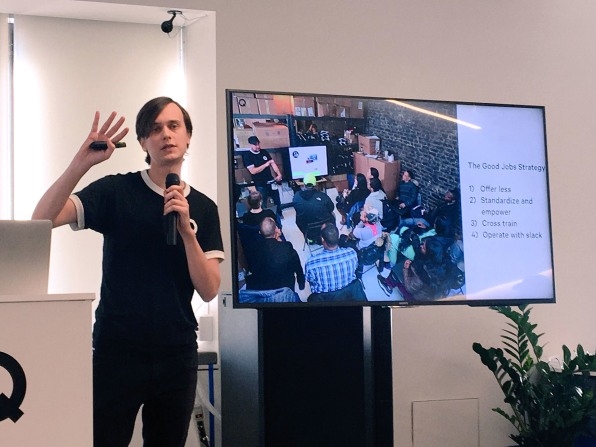For Managed By Q, Good Jobs Are Paving A Path To Profitability
A few weeks ago, I wrote about how Managed by Q was adding a Yelp-style review platform to its office management marketplace. At the time, the company’s cofounder and CEO, Dan Teran, hinted that Managed by Q was en route to being profitable.
It’s now a step closer to that: The company disclosed today that Q Services, its in-house network of cleaners, office managers, and handymen, is profitable as of this month. When Managed by Q launched in 2014, Q Services was its core business. And while it has since expanded its operation to include the aforementioned marketplace, Q Services–through which the company hires workers with a founding ideology to create stable, well-paying jobs–still accounts for more than half the business.

“Obviously, for Managed by Q as a whole, we’re still investing very heavily in growth and technology, and we have some really big bets, and we’re going to see how they play out,” Teran told me at the Fast Company Innovation Festival today. “But for the 700-plus people who work in Q Services . . . those good jobs are not going away. That’s something we’re really proud of.”
Why does this matter? Because it helps support Managed by Q’s founding mission. Teran staked his business on the “good jobs strategy,” which posits that training and investing in workers, paying them fairly, and providing benefits would lead to higher employee and customer retention.
For Managed by Q, that meant paying workers a starting salary of $12.50 an hour, offering benefits like health insurance and a 401(k) plan, and promising upward career mobility. In fact, 70% of the field managers employed by Q Services were first hired for entry-level roles at the company. And last year, Teran decided to give stock options to all of his employees, including those in Q Services.

“Anytime the company has been written about in the last three-and-a-half years, it’s always couched in this language of ‘That’s a nice thought, but does it work? Can it actually be a sustainable business or is this some sort of venture-funded fantasy?’” Teran said. “It is not lost on me and the team here that there’s a lot of pressure on us.”
As Managed by Q suspected, the end result has been less turnover across both Q Services and Managed by Q’s clientele—and as such, less money spent on training, recruitment, and marketing. Quartz reports that, in its calculation of profitability, Managed by Q included salaries and benefits for employees of Q Services; the costs of recruitment, training, and software; uniforms and other equipment; as well as workers’ compensation and an insurance policy.
Teran wouldn’t reveal too much about where Managed by Q will go from here, aside from noting that the company is investing in its digital marketplace and expanding to other cities next year. (Currently, it only operates in New York, Los Angeles, Chicago, and the San Francisco Bay Area.) But there is one thing Teran hopes will happen in coming years—that VCs and entrepreneurs will be inspired by Managed by Q’s model in much the same way that they were inspired by Uber’s a few years ago.
“I hope in, say, the next 10 years, you start to see ‘Q for X’ on pitch decks,” he mused.
Fast Company , Read Full Story
(28)










